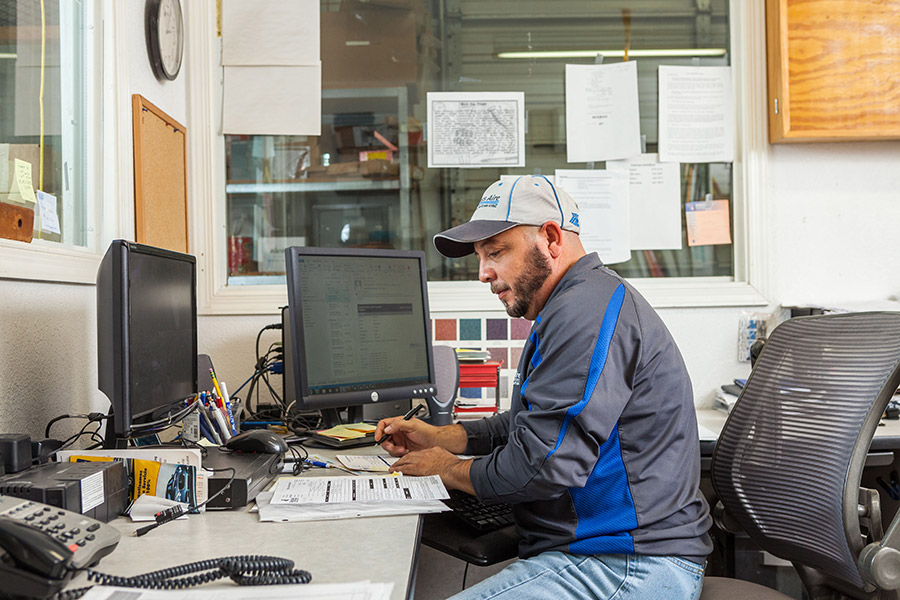
Commercial HVAC Systems: Reliable Performance for All Commercial Spaces
Commercial HVAC systems are important for comfort and good air quality in small and large buildings.Our advanced systems keep the temperature just right and are essential for meeting the heating and cooling needs of different spaces. Preventative maintenance is provided by top HVAC professionals to keep systems running smoothly and lasting longer. Not only do these state-of-the-art systems consistently maintain optimal temperature levels, but they also prove to be the backbone in fulfilling the tough heating and cooling demands of diverse spaces. The high performance comes from being reliable, effective and efficient. In businesses, having a steady indoor environment is crucial. So, having HVAC systems that work without fail is very important.
Commercial HVAC units are designed to cover larger spaces and are typically more complex. They consist of multiple indoor units and a larger outdoor unit, providing controlled temperature and indoor air quality. Ensuring that these systems remain operational day in and day out is no small feat.
It’s here that preventative maintenance steps into the spotlight, offered by elite HVAC professionals to ensure maximum system uptime and longevity. Regular maintenance doesn’t just promise smoother operations but actively guards against unexpected hitches, ensuring that business operations remain unhindered.
Reliability and Preventative Maintenance
For commercial entities, reliability isn’t just a preference – it’s a requirement. Downtime isn’t an option. That’s why there’s a heavy emphasis on preventative maintenance with commercial HVAC systems. We ensure each part, from the condenser coils to the evaporator coils, performs optimally. Regular check-ups and maintenance ensure that these units work day in, day out, offering consistent air quality and comfort.
With technologies continually evolving, the HVAC industry is no different. Regular training ensures technicians are equipped to handle and maintain these complex systems, ensuring smooth business operations. A well-maintained HVAC system can lead to lower energy bills. Plus, with the advancements in heating, ventilation, and air conditioning technology, the newer systems include features that monitor and adjust temperature humidity levels, ensuring optimal air quality.
The Evolving Landscape of HVAC Technology
With constant advancements, there’s always something new on the horizon. It’s vital for our technicians to stay up to date of these changes. That’s why continuous training is important at Kings Aire, ensuring our team can tackle any HVAC system work and challenge, no matter how modern the unit.
Types of Commercial HVAC Systems
Single Split Systems
Ideal for smaller commercial buildings, single split systems are both cost-effective and versatile. These systems are mainly gas-operated, consisting of three primary components: a furnace, an evaporative coil placed atop the furnace, and an external condenser. Each system operates independently, making them perfect for businesses that need precise temperature control in certain areas. One of their standout features is their scalability – as businesses grow, they can effortlessly add more units. Furthermore, should one unit experience issues, the performance of the other units remains unaffected, guaranteeing continuous indoor comfort.
Package Units
Package Units are comprehensive HVAC solutions that house both the cooling and heating components within a single “package”. Available in both gas and electric variants, these units are especially valuable for businesses with limited space. The integrated nature of these units, combining the furnace, evaporative coil, and the condenser, ensures efficient operation. Their ability to provide both cooling and heating, combined with their space-saving design, makes them indispensable for establishments with space constraints.
Ductless Mini Split Units (Heat Pumps)
These units, running solely on electricity, consist of an interior head and an exterior condenser. Distinguishing them from other HVAC systems is their general lack of ductwork, making installation seamless, especially in spaces where traditional duct systems might not be feasible. Known as heat pumps, these ductless systems can efficiently transfer heat between the inside and outside, catering to both heating and cooling requirements. Their efficiency shines particularly in regions with moderate climates, often leading to reduced energy expenses.
Choosing the Right System
Deciding on the right HVAC system boils down to individual needs. Consider the size of your space, the climate, and the specific demands of your business. While energy efficiency is a significant factor, the primary focus for building owners should be reliability and adaptability, given the rapid advancements in HVAC technology
Contact Kings Aire
Commercial HVAC systems are an essential investment for any business owner. Their ability to regulate temperature humidity, maintain air quality, and offer day-to-day reliability makes them invaluable. As industry landscapes evolve, so do the tools that define them. Your HVAC system isn’t just a fixture in your establishment; it’s a testament to your commitment to quality, comfort, and unwavering reliability.
At Kings Aire, we understand that promise. Our team, armed with cutting-edge knowledge and unmatched dedication, ensures that your HVAC system reflects the excellence your business stands for. Every space has unique demands, and we’re here to meet them head-on. For a system that doesn’t just heat and cool but elevates your commercial space, contact us. Let’s shape the perfect environment together.
Experienced Staff
Kings Aire has been doing business in the El Paso area for over 40 years
24/7 Emergency Service
Day or night, we're always available for emergency service calls
NATE Certified Techs
Most of our technicians are NATE certified to ensure excellent service
100% Satisfaction
Our goal is for you to be 100% satisfied with every service we provide
